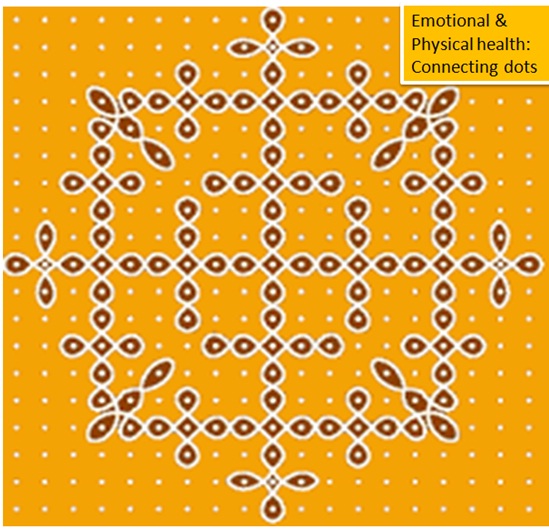
Emotional health & Physical health – Connecting the dots
Emotions that are freely experienced and expressed without judgment or attachment tend to flow fluidly. People who have good emotional health are aware of their thoughts, feelings and behaviors. They have learned healthy ways to cope with the stress and problems that are a normal part of life. They feel good about themselves and have healthy relationships.
However, many things that happen in life can disrupt emotional health and lead to strong feelings of sadness, stress or anxiety. As they say, five fingers are not equal and emotions in life can be good or bad and everyday life will go through happenings. Some of the reasons that can bring changes in mental health can be:
- Being laid off from job
- Having a child leave – change of life style
- Change of place
- Dealing with the death of a loved one
- Getting divorced or married
- Suffering an illness or an injury
- Getting a job promotion
- Experiencing money problems
- Moving to a new home
- Having a baby -change of life style
- Social pressure, peer pressure
- Trouble in relationships
Remember “good” changes can be just as stressful as “bad” changes.
How can emotions affect health?
Your body responds to the way you think, feel and act. This is called the “mind/body connection.” When chronic stress from negative attitudes and feelings of helplessness and hopelessness can upset the body’s hormone balance and deplete the brain chemicals required for feelings of happiness, as well as have a damaging impact on the immune system. When you are stressed, anxious or upset, your body tries to tell you that something is not right. For example, high blood pressure or stomach ulcer might develop after a particularly stressful event, such as the death of a loved one. New scientific understandings have also identified the process by which chronic stress can actually decrease our lifespan by shortening our telomeres. The following signs show that your emotional health is out of balance:
- Back pain
- Change in appetite
- Chest pain
- Constipation or diarrhea
- Dry mouth
- Extreme tiredness
- General aches and pains
- Headaches
- High blood pressure
- Insomnia
- Lightheadedness
- Palpitations (the feeling that your heart is racing)
- Sexual problems
- Shortness of breath
- Stiff neck
- Sweating
- Upset stomach
- Weight gain or loss
Poor emotional health can weaken body’s immune system, making you more likely to get colds and other infections during emotionally difficult times you may not feel like exercising, eating nutritious foods or taking medicine that your doctor prescribes. Abuse of alcohol, tobacco or other drugs may also be a sign of poor emotional health. Our emotional and physical health is inextricably linked. Whether we are happy or sad, our bodies respond physically to the way we think, feel and act.
Overcoming emotional stress:
The importance of positivity
Depression, pessimism and apathy affect our health in several ways. Low mood is linked to low levels of serotonin and dopamine, the feel-good neurotransmitters in the brain. According to studies by Scientist Barbara Fredrickson, in order to offset the negativity bias and experience a harmonious emotional state, we need to experience three positive emotions for every negative one. In other words, we need to find three positive effects that can happen when something negative happens in life. These positive emotions literally reverse the physical effects of negativity and build up psychological resources that contribute to a flourishing life.
Forgiveness
The practice of forgiveness has linked to better immune function and a longer lifespan. The attitude of forgiveness—fully accepting that a negative circumstance has occurred and relinquishing negative feelings surrounding the event—can be learned and can lead us to experience better mental, emotional and physical health. Other studies have shown that forgiveness has more than just a metaphorical effect on the heart: it can actually lower our blood pressure and improve cardiovascular health as well.
Gratitude
Showing gratitude to people who helped, who raised and supported us is important in life. Acknowledging the good aspects of life and giving thanks have a powerful impact on emotional wellbeing. In a landmark study, people who were asked to count their blessings felt happier, exercised more, had fewer physical complaints, and slept better than those who created lists of hassles. It is not joy that makes us grateful, but gratitude that makes us joyful.
Emotional resilience
Resilience in the face of adversity is a gift that will keep on giving both mentally and physically. Resilient people are able to experience tough emotions like pain, sorrow, frustration, and grief without falling apart—in fact, some people are able to look at challenging times with optimism and hope, knowing that their hardships will lead to personal growth and an expanded outlook on life. Resilient people retain a sense of positivity that helps them overcome the negative effects of their situation. Positive emotions have a scientific purpose—to help the body recover from the ill effects of negative emotions. Thus cultivating positivity over time can help us become more resilient in the face of crisis or stress. Stress leaves you in a fight-or-flight state in which your body turns off long-term building and repair projects,’ says Robert Sapolsky, professor of biological sciences at Stanford.
References:
1) http://www.takingcharge.csh.umn.edu/
2) https://www.psychologies.co.uk
Author: HealthyLife | Posted on: August 14, 2015
« Change is the Law of Universe – Bhagavada Gita Quick ways to get out of Stress to Relax Body and Mind »






















Write a comment